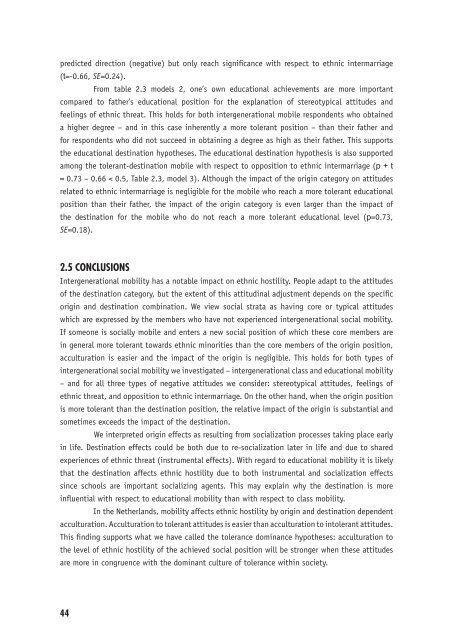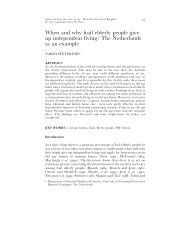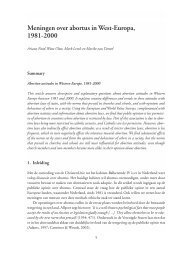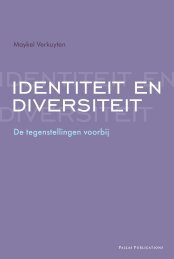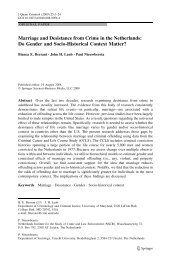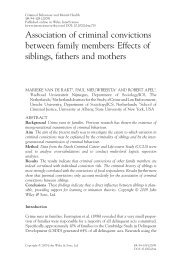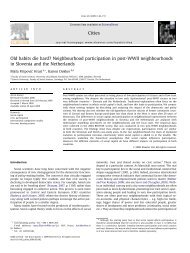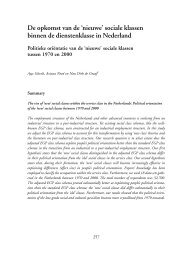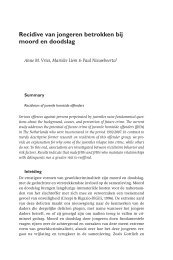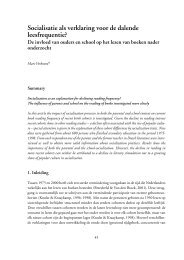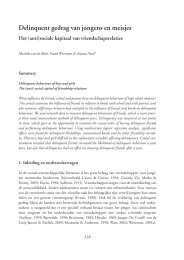Ethnic Hostility among Ethnic Majority and Minority Groups
Ethnic Hostility among Ethnic Majority and Minority Groups
Ethnic Hostility among Ethnic Majority and Minority Groups
Create successful ePaper yourself
Turn your PDF publications into a flip-book with our unique Google optimized e-Paper software.
predicted direction (negative) but only reach signifi cance with respect to ethnic intermarriage<br />
(t=-0.66, SE=0.24).<br />
From table 2.3 models 2, one’s own educational achievements are more important<br />
compared to father’s educational position for the explanation of stereotypical attitudes <strong>and</strong><br />
feelings of ethnic threat. This holds for both intergenerational mobile respondents who obtained<br />
a higher degree – <strong>and</strong> in this case inherently a more tolerant position – than their father <strong>and</strong><br />
for respondents who did not succeed in obtaining a degree as high as their father. This supports<br />
the educational destination hypotheses. The educational destination hypothesis is also supported<br />
<strong>among</strong> the tolerant-destination mobile with respect to opposition to ethnic intermarriage (p + t<br />
= 0.73 – 0.66 < 0.5, Table 2.3, model 3). Although the impact of the origin category on attitudes<br />
related to ethnic intermarriage is negligible for the mobile who reach a more tolerant educational<br />
position than their father, the impact of the origin category is even larger than the impact of<br />
the destination for the mobile who do not reach a more tolerant educational level (p=0.73,<br />
SE=0.18).<br />
2.5 CONCLUSIONS<br />
Intergenerational mobility has a notable impact on ethnic hostility. People adapt to the attitudes<br />
of the destination category, but the extent of this attitudinal adjustment depends on the specifi c<br />
origin <strong>and</strong> destination combination. We view social strata as having core or typical attitudes<br />
which are expressed by the members who have not experienced intergenerational social mobility.<br />
If someone is socially mobile <strong>and</strong> enters a new social position of which these core members are<br />
in general more tolerant towards ethnic minorities than the core members of the origin position,<br />
acculturation is easier <strong>and</strong> the impact of the origin is negligible. This holds for both types of<br />
intergenerational social mobility we investigated – intergenerational class <strong>and</strong> educational mobility<br />
– <strong>and</strong> for all three types of negative attitudes we consider: stereotypical attitudes, feelings of<br />
ethnic threat, <strong>and</strong> opposition to ethnic intermarriage. On the other h<strong>and</strong>, when the origin position<br />
is more tolerant than the destination position, the relative impact of the origin is substantial <strong>and</strong><br />
sometimes exceeds the impact of the destination.<br />
We interpreted origin effects as resulting from socialization processes taking place early<br />
in life. Destination effects could be both due to re-socialization later in life <strong>and</strong> due to shared<br />
experiences of ethnic threat (instrumental effects). With regard to educational mobility it is likely<br />
that the destination affects ethnic hostility due to both instrumental <strong>and</strong> socialization effects<br />
since schools are important socializing agents. This may explain why the destination is more<br />
infl uential with respect to educational mobility than with respect to class mobility.<br />
In the Netherl<strong>and</strong>s, mobility affects ethnic hostility by origin <strong>and</strong> destination dependent<br />
acculturation. Acculturation to tolerant attitudes is easier than acculturation to intolerant attitudes.<br />
This fi nding supports what we have called the tolerance dominance hypotheses: acculturation to<br />
the level of ethnic hostility of the achieved social position will be stronger when these attitudes<br />
are more in congruence with the dominant culture of tolerance within society.<br />
44


